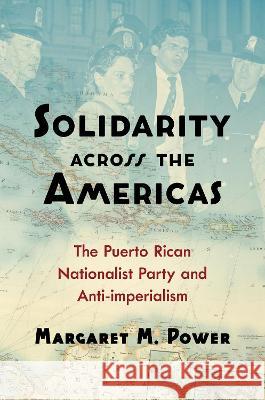Solidarity Across the Americas: The Puerto Rican Nationalist Party and Anti-Imperialism » książka
Solidarity Across the Americas: The Puerto Rican Nationalist Party and Anti-Imperialism
ISBN-13: 9781469674049 / Angielski / Twarda / 2023 / 312 str.
Solidarity Across the Americas: The Puerto Rican Nationalist Party and Anti-Imperialism
ISBN-13: 9781469674049 / Angielski / Twarda / 2023 / 312 str.
(netto: 382,49 VAT: 5%)
Najniższa cena z 30 dni: 396,71
ok. 22 dni roboczych.
Darmowa dostawa!
Throughout its quest for freedom from colonial rule, the Puerto Rican Nationalist Party (PNPR) created strategy through a solidarity that moved far beyond the archipelago. It invested significant energy, members, and resources in attending regional conferences, distributing its literature throughout the hemisphere, creating solidarity committees, presenting its case to elected officials and the general public, and promoting the causes of oppressed peoples. The hemispheric connections between supporters of Puerto Rican independence have been obscured by larger, later liberation movements as well as the island's ultimate failure in its quest for independence, but they were nonetheless at the vanguard of the postcolonial revolutions that swept the world after the Cuban revolution. Margaret M. Power's new history of the PNPR focuses on how it built a broad movement with active networks in virtually all of Latin America, much of the Caribbean, and New York City. This hemispheric view introduces a sprawling transnational network, nurtured by the PNPR from its founding in 1922 to its dissolution in 1965, that included individuals, parties, organizations, and governments throughout the Americas, and it resituates the Puerto Rican nationalist movement as a transnational revolutionary influence.











